|
|
|
Sort Order |
|
|
|
Items / Page
|
|
|
|
|
|
|
| Srl | Item |
| 1 |
ID:
082931


|
|
|
|
|
| Publication |
2008.
|
| Summary/Abstract |
This paper critically examines the different ways that analysts and policy-makers have assessed the future shape of the Cuban regime following the future passing of its long-time revolutionary leader, Fidel Castro. Certainly, from a social science perspective, the future of Cuba after Fidel Castro is open. On the other hand, different, often mutually inconsistent scenarios for regime transition suggest that Cuba's future is over-determined. Both features of social reality - openness and over-determination - create space for visions, ideologies, strategies, and other normative interventions designed to impose a particular cognitive and political order on social reality. While social science should try to include such 'subjective factors' in its objective account, it must maintain a critical distance from the normative closure and hopeful predictions that ideologies and strategies of necessity imply. Based on an analytical distinction between relatively stable systems and rapidly changing systems, this paper identifies and goes on to discuss the major systems of primary relevance for Cuba's future.
|
|
|
|
|
|
|
|
|
|
|
|
|
|
|
|
| 2 |
ID:
117040
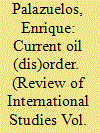

|
|
|
|
|
| Publication |
2012.
|
| Summary/Abstract |
This article has been constructed under the premise that International Political Economy provides the appropriate analytical tools for understanding the characteristics and performance of oil in economic and political relations. The article argues the need to articulate three levels of analysis (major players, scenarios, and exchange mechanisms) in order to understand the economic and political relations that underpin oil exchange during last decades. The central conclusion is that the current oil system is characterised by a set of asymmetric, unstable, and ungovernable relations, whose consequences are unpredictable but not necessarily traumatic.
|
|
|
|
|
|
|
|
|
|
|
|
|
|
|
|
| 3 |
ID:
137676
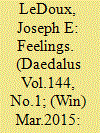

|
|
|
|
|
| Summary/Abstract |
Traditionally, we define “emotions” as feelings and “feelings” as conscious experiences. Conscious experiences are not readily studied in animals. However, animal research is essential to understanding the brain mechanisms underlying psychological function. So how can we make study mechanisms related to emotion in animals? I argue that our approach to this topic has been flawed and propose a way out of the dilemma: to separate processes that control so-called emotional behavior from the processes that give rise to conscious feelings (these are often assumed to be products of the same brain system). I will use research on fear to explain the way that I and many others have studied fear in the laboratory, and then turn to the deep roots of what is typically called fear behavior (but is more appropriately called defensive behavior). I will illustrate how the processes that control defensive behavior do not necessarily result in conscious feelings in people. I conclude that brain mechanisms that detect and respond to threats non-consciously contribute to, but are not the same as, mechanisms that give rise to conscious feelings of fear. This distinction has important implications for fear and anxiety disorders, since symptoms based on non-conscious and conscious processes may be vulnerable to different factors and subject to different forms of treatment.
|
|
|
|
|
|
|
|
|
|
|
|
|
|
|
|
| 4 |
ID:
148211
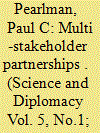

|
|
|
|
|
| Summary/Abstract |
Overwhelming evidence points to the rising burden of noncommunicable diseases (NCDs) in low- and middle-income countries (LMICs).
|
|
|
|
|
|
|
|
|
|
|
|
|
|
|
|
| 5 |
ID:
134154
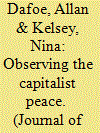

|
|
|
|
|
| Publication |
2014.
|
| Summary/Abstract |
Countries with open capital markets tend to have fewer militarized disputes and wars. Gartzke, Li & Boehmer propose that this association arises from the enhanced ability of states with open capital markets to credibly signal resolve through the bearing of economic costs ex ante to militarized escalation. We test this causal mechanism by qualitatively examining six crucial cases in which the mechanism is most likely to be operative and observable. We employ a formal case selection strategy designed to yield cases with high inferential leverage for our confirmatory test and to select cases for an exploratory analysis of scope conditions. Through analysis of media reports, government documents, and other sources, we evaluate the extent to which relevant individuals drew the appropriate inferences about market-mediated costs and resolve. We conclude that while market-mediated signaling may operate in major conflicts, it is unlikely to account for much of the association between capital openness and peace. Exploratory analysis of our cases identifies potential scope conditions, clarifies the role of different signaling mechanisms, and suggests other explanations for the peaceful behavior of countries with open capital markets.
|
|
|
|
|
|
|
|
|
|
|
|
|
|
|
|
| 6 |
ID:
147763
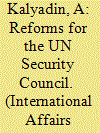

|
|
|
|
|
| Summary/Abstract |
FOR A LONG TIME, there have been heated debates about proposed reforms of the United Nations Security Council.* Various ways of adapting the council to 21st-century realities were suggested at the General Assembly's 70th jubilee session. The main points of controversy were whether, in the event of membership enlargement, the council should increase its number of permanent or non-permanent members and which countries should be included in the permanent group if the latter bacame larger. Unfortunately, these debates don't seem likely to be over any time soon.
|
|
|
|
|
|
|
|
|
|
|
|
|
|
|
|
| 7 |
ID:
177477
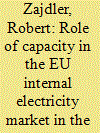

|
|
|
|
|
| Summary/Abstract |
Since the judgment in Case 6/64 Costa v ENEL electricity (electrical energy) has been considered as ‘good’ subject to the principle of free movement of goods of the European Union (EU). Although the EU electricity market has undergone fundamental regulatory and technological changes, this qualification still determines the assessment of regulatory solutions. The changes that have taken place have made it possible for resource adequacy to be ensured not only by generators but also by “demand side management”. It changes the market from a single-product market where electricity is the exclusive commodity (‘good’) traded to a two-commodity market where capacity securing resource adequacy is the second product. It raises the question if the capacity is good or service and how it affects qualification of electricity as a good and a model for developing EU regulation based on this assumption. In Case T-793/14 Tempus Energy the General Court challenged the British capacity market which also affected the Polish one, showing the need for delimitation of this concept. The aim of this article is to try to give answers to these questions. The article aims to propose such a delimitation and the consequences that result from for the EU electricity market.
|
|
|
|
|
|
|
|
|
|
|
|
|
|
|
|
| 8 |
ID:
148205
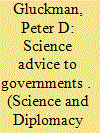

|
|
|
|
|
| Summary/Abstract |
One of the most significant manifestations of science’s changed relationship with society has been its place within public policy. There is an ever-growing recognition that science has an important role to play in virtually every dimension of policy making at every level of government, from local to international.
|
|
|
|
|
|
|
|
|
|
|
|
|
|
|
|
| 9 |
ID:
148208
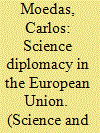

|
|
|
|
|
| Summary/Abstract |
As the executive body of the European Union (EU), the European Commission represents the interests of the EU as a whole through its right of legislative initiative, its executive functions, and its duties of representation regarding the EU’s twenty-eight member states. Under the leadership of President Jean-Claude Juncker, the commission is carving out a new, more political role for itself. At a time of great political uncertainty—exacerbated by the sovereign debt crisis and the sensitive political and humanitarian consequences of nearby conflicts in Ukraine and Syria—the commission must demonstrate clear political leadership in the interests of Europe.
|
|
|
|
|
|
|
|
|
|
|
|
|
|
|
|
| 10 |
ID:
155194
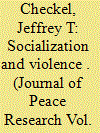

|
|
|
|
|
| Summary/Abstract |
This article sets the stage for a special issue exploring group-level dynamics and their role in producing violence. My analytic focus is socialization, or the process through which actors adopt the norms and rules of a given community. I argue that it is key to understanding violence in many settings, including civil war, national militaries, post-conflict societies and urban gangs. While socialization theory has a long history in the social sciences, I do not simply pull it off the shelf, but instead rethink core features of it. Operating in a theory-building mode and drawing upon insights from other disciplines, I highlight its layered and multiple nature, the role of instrumental calculation in it and several relevant mechanisms – from persuasion, to organized rituals, to sexual violence, to violent display. Equally important, I theorize instances where socialization is resisted, as well as the (varying) staying power of norms and practices in an individual who leaves the group. Empirically, the special issue explores the link between socialization and violence in paramilitary patrols in Guatemala; vigilantes in the Bosnian civil war; gangs in post-conflict Nicaragua; rebel groups in the Democratic Republic of Congo, El Salvador, Sierra Leone and Uganda; post-conflict peacekeepers; and the US and Israeli military. By documenting this link, we contribute to an emerging research program on group dynamics and conflict.
|
|
|
|
|
|
|
|
|
|
|
|
|
|
|
|
| 11 |
ID:
157784
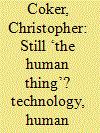

|
|
|
|
|
| Summary/Abstract |
Is war beginning to escape human control? Thucydides tells us the war is one of the things that makes us definitively human; but how long will this continue to be the case as our relationship with technology continues to develop? Kenneth Waltz’s book Man, the State and War affords one way of answering that question. So too does Nikolaas Tinbergen’s framework for understanding human behaviour and Bruno Latour’s Actor–Network Theory (ANT). The main focus of this article is the extent to which we will diminish or enhance our own agency as human beings, especially when we come to share the planet with an intelligence higher than our own.
|
|
|
|
|
|
|
|
|
|
|
|
|
|
|
|
| 12 |
ID:
107043
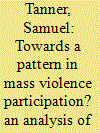

|
|
|
|
|
| Publication |
2011.
|
| Summary/Abstract |
In this article, I focus on the logic whereby a group of eight Hutu became involved in mass violence during the 1994 Rwandan genocide. This process is considered as a sequence of meaningful events that progressively shaped the actors' frame of analysis. As such, each sequence brings a new qualitative reality which, in turn, constitutes the platform upon which the involvement in, and the perpetration of, mass violence become acceptable and legitimate in the eyes of the perpetrators. Based on both Howard S. Becker's notion of career and Roger Petersen's analysis of resistance and rebellion, I disaggregate the entire process of participation in mass violence into a sequence of six mechanisms, generating two main phases. The first one, mobilisation, refers to the movement from a neutral state to a mobilised state. The second phase, collective action, covers the drift from mobilisation to action, namely, killings.
|
|
|
|
|
|
|
|
|
|
|
|
|
|
|
|
| 13 |
ID:
101514
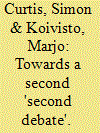

|
|
|
|
|
| Publication |
2010.
|
| Summary/Abstract |
This article examines the contemporary disciplinary claims that the 'Second Debate' in international theory was partial and incomplete. Developing the view that the debate exclusively concerned positivist methods, not the status and merits of social scientific inquiry in international relations theory (IR) more broadly, the article advances an understanding of how contemporary 'social scientific' IR has begun to integrate historicist and generalising claims in a single theoretical framework. Moreover, the article seeks to transcend the assumption of incommensurability between scientific and historical frames of inquiry that characterised the idea of scientific inquiry in the Second Debate, and does this through an intellectual history of arguments for a 'science of society'. The article shows how the emergence of non-positivist alternatives entails the development of abstractions and limited generalisations based on 'mechanismic explanation', particularly suitable for the development of middle-range theorising in IR. Overall, we argue that one important implication of the named methodological discussion is the reinforcing of the place of historical sociological analysis at the centre stage of international theory.
|
|
|
|
|
|
|
|
|
|
|
|
|
|
|
|
|
|
|
|
|